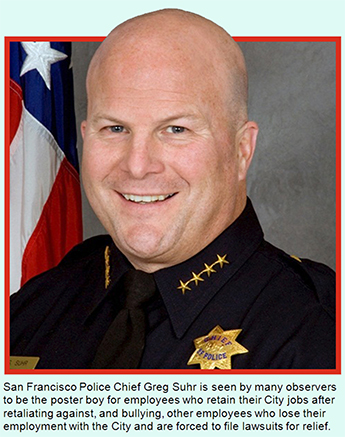 Westside Observer
Westside Observer July – August 2015 at www.WestsideObserver.com
Grand Jury’s Whistleblower Report and Police Chief Greg Suhr’s Slurs
Retaliators Keep Their City Jobs
Article in Press Printer-friendly PDF file
 Westside Observer
Westside Observer
July – August 2015 at www.WestsideObserver.com
Grand
Jury’s Whistleblower Report and Police Chief Greg Suhr’s
Slurs
Retaliators
Keep Their City Jobs
by Patrick Monette-Shaw
All too often, City employees — including department heads
and their deputy directors — who engage in retaliation and
prohibited personnel practices get off scot-free, are never disciplined,
and keep their highly-paid jobs.
Conversely, employees who report waste, fraud, or corruption in City government typically lose their employment, often suffer great emotional distress, and are insufficiently compensated for financial losses and loss of livelihoods. That is, the bad guys win and keep their jobs, while the good guys lose their incomes and jobs. For example, take Chief of Police Greg Suhr.
The City has no program in place to provide notice to potential retaliators that they may face discipline or termination if they engage in retaliation against their co-workers. That may explain why retaliation occurs all too frequently.
Remedies for victims of retaliation are scare, providing little relief from the retaliation, or reinstatement to their jobs.
During the past several years, the Westside Observer has reported extensively on whistleblowers facing retaliation — ranging from my article “High Costs of City Attorney’s Advice (Retaliation and Bullying of City Employees)” in May 2013, to a whole host of Observer articles across the years by former Laguna Honda Hospital whistleblowing physicians, Derek Kerr and Maria Rivero — while mainstream media outlets have all but turned a blind eye.
Civil Grand Jury Weighs In
On June 8, San Francisco’s 2014–2015 Civil Grand Jury released its report “San Francisco’s Whistleblower Protection Ordinance Is in Need of Change,” dated May 2015. It’s a damning indictment of City Hall’s failure to adequately strengthen whistleblower protections for City employees.
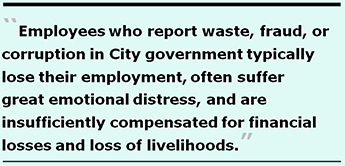 The Grand Jury reports
that although “San Francisco has enacted a series of ordinances
intended to protect City officers and employees from retaliation
for reporting improper government activity” since 1989, over
the years “the scope of these so-called ’whistleblower
protection’ laws has narrowed,” with protections that
are currently much weaker than protections for state and federal
government employees.
The Grand Jury reports
that although “San Francisco has enacted a series of ordinances
intended to protect City officers and employees from retaliation
for reporting improper government activity” since 1989, over
the years “the scope of these so-called ’whistleblower
protection’ laws has narrowed,” with protections that
are currently much weaker than protections for state and federal
government employees.
The Jury concluded that our the Board of Supervisors failed to carry out a mandate to enact and maintain an ordinance after voters passed Proposition C in 2003 requiring the Board to develop adequate protections for City officers and employees against retaliation for filing complaints involving improper government activity by City officers and employees.
When City employees suffer retaliation for disclosing improper or illegal activity, they are entitled to file whistleblower complaints with the Ethics Commission or with the City Controller’s whistleblower program, but face significant hurdles before they can safely file lawsuits against the City alleging on-the-job retaliation.
The Grand Jury’s new report focused principally on complaints filed with the Ethics Commission, noting that a previous inquiry by the 2010–2011 Civil Grand Jury that focused on the Controller’s whistleblower program administered by its City Services Auditor (CSA) division was just three years old. While the new Grand Jury report is crucially needed, problems with the City Controller’s program remain in significant measure and haven’t been fixed.
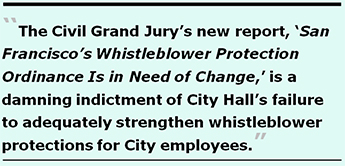 The new 2014–2015
Grand Jury notes that in the 15-year history of the Ethics Commission,
no whistleblower retaliation complaint has been upheld by the
Ethics Commission, or ever resulted in a public accusation of
wrongdoing, because all complaints are investigated in secret
and all have been dismissed without public hearings. The Jury
noted that between January 1, 2011 and November 18, 2014, the
Ethics Commission received 34 whistleblower retaliation complaints,
all of which were dismissed by its Executive Director.
The new 2014–2015
Grand Jury notes that in the 15-year history of the Ethics Commission,
no whistleblower retaliation complaint has been upheld by the
Ethics Commission, or ever resulted in a public accusation of
wrongdoing, because all complaints are investigated in secret
and all have been dismissed without public hearings. The Jury
noted that between January 1, 2011 and November 18, 2014, the
Ethics Commission received 34 whistleblower retaliation complaints,
all of which were dismissed by its Executive Director.
Because the current Whistleblower Protection Ordinance (WPO) is excessively narrow in scope, retaliation complaints fare poorly before San Francisco’s Ethics Commission, the Jury reports.
Narrow Protections
San Francisco’s WPO protects only employees who make disclosures “in house.” In order to have the WPO apply, whistleblowers must disclose their government wrongdoing complaints only to certain City government agencies and in certain approved ways; otherwise, the WPO doesn’t apply and provides no protections. The Jury notes:
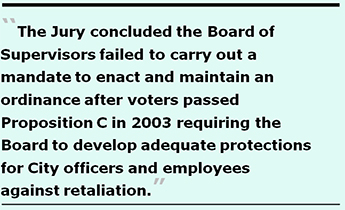 If an employee suffers
retaliation for reporting wrongdoing to any agency not listed
in the WPO ordinance, their complaint will likely be dismissed
by the Ethics Commission or its heavy-handed Executive Director.
The Commission also dismisses complaints that are not listed in
the WPO’s narrow limit of disclosures; waste, fraud, abuse
in general, or violations of general law are not included. The
Jury notes whistleblowers who disclose such information are not
protected from retaliation.
If an employee suffers
retaliation for reporting wrongdoing to any agency not listed
in the WPO ordinance, their complaint will likely be dismissed
by the Ethics Commission or its heavy-handed Executive Director.
The Commission also dismisses complaints that are not listed in
the WPO’s narrow limit of disclosures; waste, fraud, abuse
in general, or violations of general law are not included. The
Jury notes whistleblowers who disclose such information are not
protected from retaliation.
The WPO prohibits only a few types of retaliation — termination, demotion, suspension, and similar job actions — and doesn’t address a wide variety of lesser reprisals and coercion, including non-promotion or reassignment. The Jury notes that even if an employee clears all the hurdles and retaliation is found to have occurred, the Ethics Commission can’t restore employees’ jobs lost due to wrongful termination. While the Commission could theoretically punish an employee found to have engaged in retaliation, no such punishment has ever been handed out.
Of the 34 whistleblower retaliation complaints the Ethics Commission received between January 2011 and November 2014, 15 complaints alleged neither the type of whistleblowing, nor the type of retaliatory actions, covered by the WPO. “Thus, 44% of whistleblower retaliation complaints received during the last four years fell outside the scope of the WPO,” the Jury’s report notes.
Most victims of retaliation have no recourse under the WPO, and frequently are left with a single option of filing costly, time-consuming lawsuits against the City. Although they’ve gotten nowhere with the Ethics Commission, City employees have successfully litigated whistleblower wrongful termination retaliation complaints in San Francisco Superior Court and the Appellate Court, at great expense.
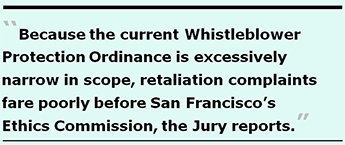 The
WPO’s Evolution
The
WPO’s Evolution
The Grand Jury reports San Francisco first addressed whistleblower protection when then-Mayor Art Agnos signed the Improper Government Activities Ordinance (IGAO) 26 years ago in 1989, which permitted employees injured by retaliation to sue for a paltry $5,000 in civil damages, an amount unlikely to pay for attorney’s fees, court costs, or financial damages that result from wrongful termination; Agnos hired Ed Lee to be the whistleblower protection ordinance’s first investigator. The current Grand Jury dryly noted the $5,000 is now worth half that, given Consumer Price Index increases since 1989.
The IGAO authorized the Mayor to investigate reports of official misconduct, and it forbade threats or retaliation of any kind against employees who reported misconduct.
Within 11 years, the Board of Supervisors managed to repeal the IGAO in 2000, replacing it with the WPO, which then-Mayor Willie Brown signed into law. The replacement WPO transferred investigation of whistleblower complaints from the Mayor’s Office to the Ethics Commission. “Slick” Willie and the Board of Supervisors narrowed the range of disclosures that would qualify for retaliation protection.
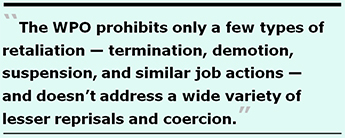 The new WPO narrowed
covered disclosure protections to only those allegations of violations
of laws enforced by the Ethics Commission; allegations of gross
misconduct, economic waste, or violations of general law were
removed from protection.
The new WPO narrowed
covered disclosure protections to only those allegations of violations
of laws enforced by the Ethics Commission; allegations of gross
misconduct, economic waste, or violations of general law were
removed from protection.
In the wake of shrinking protections for City employees, voters passed the 2003 Proposition “C” Charter amendment creating the City Controller’s City Services Auditor (CSA) unit charged with developing a whistleblower program, including a whistleblower hotline, a program that has proven to be essentially useless in the dozen years since created.
Prop C also included a mandate requiring the Board of Supervisors to enact an ordinance to protect whistleblowers from retaliation. In the 12 years since passage of Prop C, the Grand Jury reports the WPO essentially remains as it was before the 2003 Charter change, because the Board hasn’t made substantive changes in anti-retaliation provisions.
The Grand Jury’s Findings and Recommendations
 The
WPO is addressed to potential victims of retaliation, rather than
addressed to retaliators. For example, retaliators receive no
notice that they may face discipline or may face termination for
retaliating against their co-workers.
The
WPO is addressed to potential victims of retaliation, rather than
addressed to retaliators. For example, retaliators receive no
notice that they may face discipline or may face termination for
retaliating against their co-workers.
This may help explain why the Grand Jury’s numbered recommendations include:
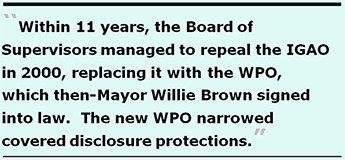 1.3: If the
Ethics Commission requests that the Board amend the WPO and the
Board fails to act, that the Commission consider submitting such
an amendment directly to the voters.
1.3: If the
Ethics Commission requests that the Board amend the WPO and the
Board fails to act, that the Commission consider submitting such
an amendment directly to the voters.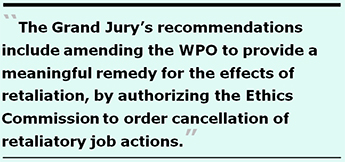 3: That amendments
to the WPO provide a meaningful remedy for the effects of retaliation,
by authorizing the Ethics Commission to order cancellation of
a retaliatory job action, and increasing the limit of the civil
penalty available under the WPO to an amount adequate to repay
the financial losses that can result from such an action.
3: That amendments
to the WPO provide a meaningful remedy for the effects of retaliation,
by authorizing the Ethics Commission to order cancellation of
a retaliatory job action, and increasing the limit of the civil
penalty available under the WPO to an amount adequate to repay
the financial losses that can result from such an action.Required responses to the Civil Grand Jury by the Ethics Commission’s Executive Director, the Ethics Commission, the Board of Supervisors, and the Mayor have not been released yet, but it’s a safe bet that City Hall will do all it can to block implementation of the Jury’s eight recommendations.
[Editor’s Note: The 2014–2015 Civil Grand Jury may have erred as past Jury’s have, by requesting responses from the Ethics Commission’s Executive Director, because typically governing Boards and Commission are required to respond to Grand Jury’s on behalf of their “body,” not Executive Director’s who may harbor opinions divergent from the governing body’s official opinions.]
Chief Suhr’s Storied History
 As media reports
and court documents show, Chief Suhr appears to have engaged in
wrongful termination retaliation against Kelly O’Haire, who
was awarded a settlement of $725,000 when San Francisco officials
came to their senses on Friday, April 24 and agreed to settle
the case just before jury selection in the case was to commence.
As media reports
and court documents show, Chief Suhr appears to have engaged in
wrongful termination retaliation against Kelly O’Haire, who
was awarded a settlement of $725,000 when San Francisco officials
came to their senses on Friday, April 24 and agreed to settle
the case just before jury selection in the case was to commence.
As the San Francisco Chronicle reported on April 22, “despite the growing number of False Claims Act cases, whistleblowers are still subject to disdain and even retaliation.” The Chronicle further reported that “for the most part, whistleblowers are honest people with strong distinctions between right and wrong.”
The Chronicle failed to report, however, that retaliation is alive and well in San Francisco City government.
Failure to Report a Friend’s Domestic Violence Incident
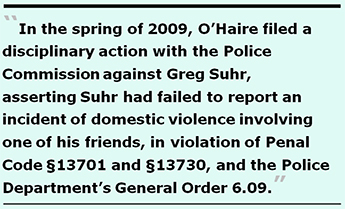 A
former top lawyer in the San Francisco Police Department, O’Haire
is one such whistleblower who is honest, and knows right from
wrong. She asserts that she was terminated in retaliation for
creating a strategy and putting together a case for terminating
then-Deputy Chief Greg Suhr. Details of the case revealed in her
First Amended Complaint in San Francisco Superior
Court on August 13, 2013 are disturbing.
A
former top lawyer in the San Francisco Police Department, O’Haire
is one such whistleblower who is honest, and knows right from
wrong. She asserts that she was terminated in retaliation for
creating a strategy and putting together a case for terminating
then-Deputy Chief Greg Suhr. Details of the case revealed in her
First Amended Complaint in San Francisco Superior
Court on August 13, 2013 are disturbing.
As an SFPD attorney, O’Haire was responsible for investigating and prosecuting disciplinary actions against Police Department members, including sworn officers, before the San Francisco Police Commission. Before she was hired, approximately 400 police misconduct cases had accumulated, a backlog then Police Chief Heather Fong was unaware of. Due to O’Haire’s efforts, “dozens” of SFPD sworn officers were disciplined for misconduct. Given her successes, great hostility in the Police Department against her was more than probable.
In the spring of 2009, O’Haire filed a disciplinary action with the Police Commission against Greg Suhr, asserting Suhr had failed to report an incident of domestic violence involving one of his friends, in violation of Penal Code §13701 and §13730, and the Police Department’s General Order 6.09, which requires police officers to treat all acts of domestic violence as criminal conduct. O’Haire alleged Suhr had not only failed to file a police incident report, he failed to arrest the perpetrator, since the Penal Code and General Order require arrest in both misdemeanor and felony domestic violence cases.
By report, Suhr advised the victim not to include his name in her complaint, which some observers view as witness tampering. The victim suffered bruising, strangulation, and a broken collar bone, and the perp was later charged with attempted murder, which is a felony.
Both O’Haire’s August 2013 Superior Court Complaint, and an April 21, 2015 article in the San Francisco Examiner note that O’Haire’s investigation of Suhr had uncovered a “pattern of [his] skirting the law.” O’Haire was convinced that if she dropped her investigation of Suhr’s domestic violence case, it would also be another violation of the Penal Code for her or the Police Department to simply drop the case.
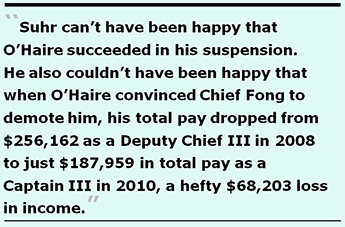 O’Haire filed
a Motion in Limine notice with the Police Commission on
July 8, 2009 seeking to introduce Suhr’s prior acts of misconduct
admitted into evidence to document that Suhr had a practice of
disregarding Police Department policies. After she filed her case
against Suhr, Chief Fong demoted him from Deputy Chief to Captain,
a demotion Suhr was not likely to have forgotten, for which he
may have harbored ill will against O’Haire.
O’Haire filed
a Motion in Limine notice with the Police Commission on
July 8, 2009 seeking to introduce Suhr’s prior acts of misconduct
admitted into evidence to document that Suhr had a practice of
disregarding Police Department policies. After she filed her case
against Suhr, Chief Fong demoted him from Deputy Chief to Captain,
a demotion Suhr was not likely to have forgotten, for which he
may have harbored ill will against O’Haire.
While O’Haire’s case was pending before the Police Commission, she received a phone call from Police Officer’s Association (POA) lawyer James (“Jim”) Collins, who was representing Suhr. Collins reportedly threatened O’Haire that she would “be sorry” she had filed the case against Suhr before the Police Commission.
Frighteningly, Mr. Collins is now a Superior Court Judge himself, boding ill for any future whistleblowers whose cases wind up being heard before him in court.
Collins’ phone call was not the only time O’Haire was threatened by POA representatives and SFPD staff that if Suhr became Police Chief that he intended to fire her. She reportedly received multiple threats to that effect.
Following George Gascón’s appointment as Chief of Police in August 2009, POA union reps who were not lawyers et with Gascón several times to negotiate for a reduced discipline on Suhr’s behalf. In late October 2009, Gascón agreed to allow Suhr to serve a low-level disciplinary five-day suspension in lieu of termination, which suspension Suhr agreed to accept. It’s not known whether Suhr’s suspension was without pay, but he can’t have been happy that O’Haire had succeeded in his suspension, besmirching his already tarnished record following demotion to captain.
Suhr also couldn’t have been happy that when O’Haire convinced Chief Fong to demote him, his total pay dropped from $256,162 as a Deputy Chief III in 2008 to just $187,959 in total pay as a Captain III in 2010, a hefty $68,203 loss in income. Some observers suspect the lost income may have contributed significantly to his animus towards O’Haire.
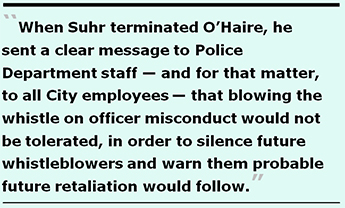 On May 16, 2011 —
within two weeks after Mayor Lee appointed Suhr Chief of Police
— SFPD terminated O’Haire, who was told she was being
“laid off” due to budgetary shortfalls, which proved
to be a pretext — a ruse — to get rid of her via an
unlawful retaliatory discharge. When O’Haire subsequently
attended an appointment with the City’s retirement system,
only then did she learn that her personnel records showed she
had been terminated, not laid off, possibly with an annotation
“do not rehire” within the City.
On May 16, 2011 —
within two weeks after Mayor Lee appointed Suhr Chief of Police
— SFPD terminated O’Haire, who was told she was being
“laid off” due to budgetary shortfalls, which proved
to be a pretext — a ruse — to get rid of her via an
unlawful retaliatory discharge. When O’Haire subsequently
attended an appointment with the City’s retirement system,
only then did she learn that her personnel records showed she
had been terminated, not laid off, possibly with an annotation
“do not rehire” within the City.
Suhr reportedly knew classifying her as being terminated rather than laid off would prevent her from future employment with the City, and would make it difficult for her to find prospective employment with other agencies, too. Suhr did so, apparently intentionally.
When Suhr terminated O’Haire, he sent a clear message to Police Department staff — and for that matter, to all City employees — that blowing the whistle on officer misconduct would not be tolerated, in order to silence future whistleblowers and warn them probable future retaliation would follow.
Remarkably, after Suhr’s appointment as Chief, during an open meeting at the Hall of Justice that included Internal Affairs Unit officers to introduce Suhr to POA members, the POA’s then-President, Gary Delagnes — who is widely viewed by observers as being thuggish — announced that “we got rid of” employees we didn’t like, referring to O’Haire and two other employees Suhr fired. Delagnes credited Suhr with having gotten rid of them. The three fired under the ruse of “budgetary cuts” reportedly did not fit in the SFPD culture, since the three had high ethical standards.
Disturbing Court Depositions
 More
remarkably, in a Court filing submitted by the City on March
13, 2015 in defense of Suhr, several declarations taken under
deposition revealed juicier details about the case. A Declaration
by Sergeant Paget Mitchell in support of O’Haire noted that
Mitchell never had any problems with Suhr until Mitchell’s
wife, Susan Nangle, an SFPD Internal Affairs investigator, was
assigned by O’Haire to investigate Suhr. Because of Mitchell’s
connections to his wife Nangle and O’Haire, he began to be
treated differently.
More
remarkably, in a Court filing submitted by the City on March
13, 2015 in defense of Suhr, several declarations taken under
deposition revealed juicier details about the case. A Declaration
by Sergeant Paget Mitchell in support of O’Haire noted that
Mitchell never had any problems with Suhr until Mitchell’s
wife, Susan Nangle, an SFPD Internal Affairs investigator, was
assigned by O’Haire to investigate Suhr. Because of Mitchell’s
connections to his wife Nangle and O’Haire, he began to be
treated differently.
Mitchell’s deposition indicated that it had become “common knowledge in Internal Affairs that Kelly O’Haire would be terminated if Suhr became Chief.” Mitchell went on to indicate that “When she was terminated by Suhr, everyone who had worked in [the] Internal Affairs Division knew that Ms. O’Haire’s termination was …” with the next two lines in the deposition blacked out as redacted. It’s not hard to imagine that the redacted end of the sentence more than likely indicated her termination was clear retaliation on Suhr’s part.
Mitchell indicated that since his job required direct interaction with the Chief in the Risk Management Unit from which O’Haire had been fired, he felt “Suhr was unethical and [I] would rather go back to patrol work [at the Northern Station] than work with Suhr directly.”
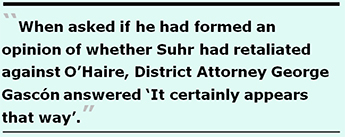 Mitchell’s Declaration
goes on to report that when he declined working for Suhr directly
in the Risk Management Unit, he filed a request for transfer.
Within a week, Mitchell was served with an investigation notice
by the Special Investigations Unit because someone had filed an
anonymous complaint alleging that Mitchell “might have information
about criminal activity by Suhr’s command staff.” Mitchell
believes the notice was meant to intimidate him. He was not transferred
to his home station at Northern, and was instead transferred to
the Park Station and put on the graveyard shift instead of his
regular day shift, which he considered to be an adverse action.
When he protested his shift assignment, he was told it was a direct
result of a “Chief’s Order” to assign him to that
shift, which Mitchell believes was clear retaliation for his work
in Internal Affairs and refusing to work in Risk Management under
Suhr.
Mitchell’s Declaration
goes on to report that when he declined working for Suhr directly
in the Risk Management Unit, he filed a request for transfer.
Within a week, Mitchell was served with an investigation notice
by the Special Investigations Unit because someone had filed an
anonymous complaint alleging that Mitchell “might have information
about criminal activity by Suhr’s command staff.” Mitchell
believes the notice was meant to intimidate him. He was not transferred
to his home station at Northern, and was instead transferred to
the Park Station and put on the graveyard shift instead of his
regular day shift, which he considered to be an adverse action.
When he protested his shift assignment, he was told it was a direct
result of a “Chief’s Order” to assign him to that
shift, which Mitchell believes was clear retaliation for his work
in Internal Affairs and refusing to work in Risk Management under
Suhr.
Another startling declaration appeared in the March 13 Court filing. In a confidential videotaped deposition by now District Attorney George Gascón, when asked if he had formed an opinion of whether Suhr had retaliated against O’Haire, Gascón answered “It certainly appears that way.”
Gascón admitted in his Deposition that O’Haire asked him to talk Mayor Lee “about affording her the opportunity to work as an attorney somewhere else within the City.” In both of Gascón’s two responses that were not redacted, City Attorney Dennis Herrera’s staff objected saying Gascón’s testimony lacked foundation, was speculation, or was hearsay under various provisions in the Evidence Code.
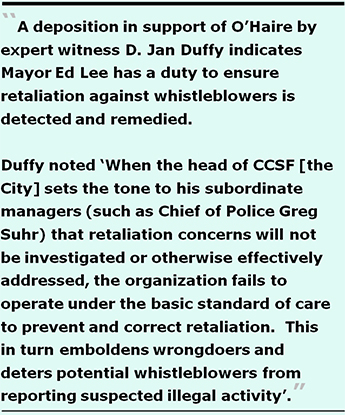 An April 6, 2015
deposition in support of O’Haire by an
expert witness, D. Jan Duffy — a consultant specializing
in management practices and investigations involving retaliation
against employees who engage in protected activity — indicates
Mayor Ed Lee has a duty to ensure retaliation against whistleblowers
is detected and remedied. Duffy’s deposition in support of
O’Haire’s attempts to require Mayor Lee provide a deposition,
notes:
An April 6, 2015
deposition in support of O’Haire by an
expert witness, D. Jan Duffy — a consultant specializing
in management practices and investigations involving retaliation
against employees who engage in protected activity — indicates
Mayor Ed Lee has a duty to ensure retaliation against whistleblowers
is detected and remedied. Duffy’s deposition in support of
O’Haire’s attempts to require Mayor Lee provide a deposition,
notes:
Local Media Reporting on O’Haire’s Lawsuit
A San Francisco Examiner article on April 21, 2015 reported that both Mayor Ed Lee and his Chief of Staff, Steve Kawa, knew of Suhr’s retaliatory firing of O’Haire, but failed to report it as required in whistleblower cases.
Another San Francisco Examiner article on April 24 about the domestic violence incident Suhr allegedly mishandled, reports Suhr received a five-day suspension after O’Haire recommended he should be terminated.
The Examiner’s April 24 article reported other Court records that show Suhr failed to report the harassment of a gay officer, violated SFPD policy by allowing videotaping of protesters, and most egregiously, his apparently failed effort to obtain a top-secret security clearance from the FBI after having lied to it. The Examiner’s April 24 article asserts gay police officer Lloyd Martin allegedly heard Suhr refer to “then-Deputy Chief Mindy Pengel as a ’man hater’ — a common slur against lesbians — who was waiting for the then [police] chief to die so she could take over [as Chief].” Pengel was the first openly lesbian police officer in SFPD, and the first lesbian appointed to SFPD’s Command Staff.
Officer Martin also testified that he heard Suhr call then-Chief Heather Fong a “Dragon Lady,” another offensive instance of racial and ethnic slurs uttered by members of the Police Department’s highest ranks. The term is usually a stereotype of East Asian women who are deceitful and is used to refer to powerful but prickly women, usually in a derogatory fashion.
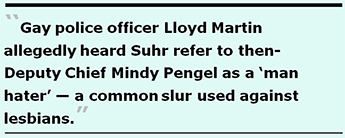 That article reported
Suhr had also failed to report in January 2005 that Martin may
have been harassed because of his sexual orientation that created
a hostile work environment.
That article reported
Suhr had also failed to report in January 2005 that Martin may
have been harassed because of his sexual orientation that created
a hostile work environment.
The San Francisco Chronicle carried an article on April 26 announcing San Francisco agreed to a $725,000 settlement award to O’Haire. The article reported that then-Chief Fong had demoted Suhr to Captain in 2009 after O’Haire filed her investigation against him with the Police Commission.
It is not yet known how much the City spent fighting O’Haire’s lawsuit, since the City Attorney’s Office declined responding to a records request until the Board of Supervisors hears and approves the settlement agreement with O’Haire. As I reported in May 2013, the City spent $304,508 in City Attorney time and expenses fighting the $726,000 settlement in the 9–1–1 dispatchers Doe and Raskin v. the City of San Francisco lawsuit, and spent $450,493 fighting Dr. Derek Kerr’s $750,000 settlement award.
It’s expected that City Attorney costs fighting O’Haire will cost much, much more.
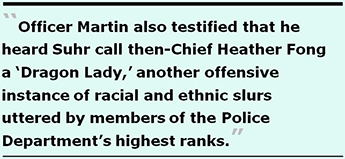 Notably, the City
reached the settlement with O’Haire just before jury selection
was set to begin. The City pushed the case to the brink, but settled
when it became apparent that even more damaging testimony might
be disclosed during a messy jury trial, with even more politically
embarrassing details made public just before the Mayor runs for
reelection.
Notably, the City
reached the settlement with O’Haire just before jury selection
was set to begin. The City pushed the case to the brink, but settled
when it became apparent that even more damaging testimony might
be disclosed during a messy jury trial, with even more politically
embarrassing details made public just before the Mayor runs for
reelection.
Back on May 15, 2013, the Marin Independent Journal carried an article by Gary Klein reporting on O’Haire’s lawsuit. Matt Dorsey, City Attorney Dennis Herrera’s spokesman, asserted at the time that O’Haire’s lawsuit ”lacks merit.” Dorsey was quoted as saying “The City Attorney is going to vigorously defend the Police Department, and we’re going to do everything we can to protect taxpayer dollars.”
Fast forward to the Chronicle’s April 26 article, and Dorsey has — comically — changed his tune. Spin-meister Dorsey is quoted as saying “We have done everything we can to make sure the claim was addressed fairly and put the matter behind us.” Dorsey is a master at spin control: There was nothing “fair” about Suhr having vengefully and wrongfully terminated O’Haire in a fit of retaliatory piqué.
The Chronicle reports Dorsey said the City had settled with O’Haire only after learning that she had not been allowed to stay for an additional period of time to increase her retirement benefits, as had two other employees fired or demoted on the same day as O’Haire. The Chronicle’s story reported the City’s account was disputed by Richard Nichelman, who was fired by Suhr at the same time. “It had nothing to do with retirement. Nothing like that happened,” Nichelman said.
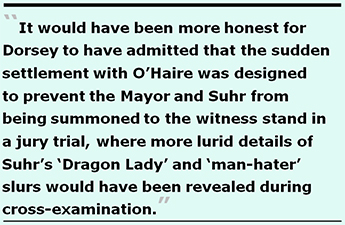 It would have been
more honest for Dorsey to have admitted that the sudden settlement
with O’Haire was designed to prevent the Mayor and Suhr from
being summoned to the witness stand in a jury trial, where more
lurid details of Suhr’s “Dragon Lady” and “man-hater”
slurs would have been revealed during cross-examination, and that
the Mayor and Kawa knew of O’Haire’s retaliatory wrongful
termination but did nothing to prevent or correct it.
It would have been
more honest for Dorsey to have admitted that the sudden settlement
with O’Haire was designed to prevent the Mayor and Suhr from
being summoned to the witness stand in a jury trial, where more
lurid details of Suhr’s “Dragon Lady” and “man-hater”
slurs would have been revealed during cross-examination, and that
the Mayor and Kawa knew of O’Haire’s retaliatory wrongful
termination but did nothing to prevent or correct it.
O’Haire’s sudden settlement may have been because the City feared Suhr’s slurs were too similar to the racist and homophobic text messages on Sergeant Ian Furminger’s cell phone revealed in Federal court records against him on March 13, 2015, text messages that implicate as many as 14 police officers harboring racist and homophobic animus.
Despite Suhr’s slurs against Heather Fong and Mindy Pengel, the Chronicle reported wayward Supervisor Scott Wiener felt compelled to weigh in, asserting Suhr is “one of the best chiefs of police I have seen,” calling into question Wiener’s own judgment in the minds of Wiener’s gay and lesbian district constituents.
The San Francisco Examiner’s article May 4, 2015 reporting that Suhr still has Mayor Lee’s backing, despite issues raised during O’Haire’s lawsuit, is troubling. The article reports that court records in the case show Suhr had allegedly lied to the FBI to get a security clearance, and that Gascón’s deposition revealed the Mayor and Kawa were informed of the retaliation against O’Haire, but did nothing. The Examiner reported Supervisor Wiener said, “I am a big fan of Chief Suhr. He has my full confidence.” Wiener and the Mayor are misguided in continuing to support Retaliator-in-Chief Suhr.
Well Mr. Wiener, you may have confidence in Suhr, but many San Franciscans do not. Given the $725,000 settlement awarded O’Haire, the court record in this case suggests her allegations of wrongful retaliatory termination were true, or the City would never have settled. San Franciscans simply do not want bully’s running entire City departments, particularly not running the Police Department.
The Marina Times Calls for Suhr to Step Down
Bravely, San Francisco’s Marina Times newspaper carried a May 4 article by its Reynolds Rap columnist, Susan Dyer Reyonds, titled “Yes, Suhr, it’s time for you to go,” calling for Suhr to step down. The Marina Times is distributed widely in Supervisor Mark Farrell’s tony Pacific Heights, the Presidio, and Marina District neighborhoods, one of San Francisco’s conservative bastions.
Reynolds also reports Suhr was demoted when O’Haire filed her Police Commission case against Suhr seeking his termination. Ms. Reynolds also reports that even earlier, then-Chief Fong had “stripped Suhr of his Head of Patrol” position in 2005, and Suhr was given the equivalent of desk duty being reassigned to the security detail for the Public Utilities Commission. Suhr has clearly had a very checkered career in the SFPD.
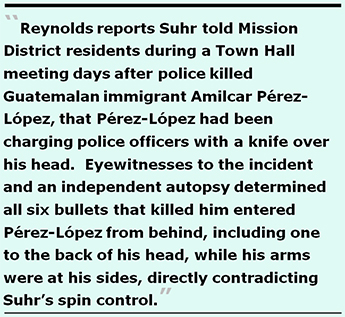 Reynolds reports
she wasn’t surprised by O’Haire’s accusations,
“having witnessed Suhr’s bullying and grudge-holding
firsthand.” She notes that when a City source alerted her
to a problem related to the SFPD, she wrote an article about it,
only to learn that her source had received an “unpleasant”
call from Suhr who hadn’t appreciated being considered in
an unflattering light. Reynolds’ source was fired months
later, and while she can’t say for certain Suhr was the reason,
“I have little doubt he was involved.”
Reynolds reports
she wasn’t surprised by O’Haire’s accusations,
“having witnessed Suhr’s bullying and grudge-holding
firsthand.” She notes that when a City source alerted her
to a problem related to the SFPD, she wrote an article about it,
only to learn that her source had received an “unpleasant”
call from Suhr who hadn’t appreciated being considered in
an unflattering light. Reynolds’ source was fired months
later, and while she can’t say for certain Suhr was the reason,
“I have little doubt he was involved.”
Reynolds reports that Suhr told Mission District residents during a Town Hall meeting days after police killed Guatemalan immigrant Amilcar Pérez-López, that Pérez-López had been charging police officers with a knife over his head, corroborating the account of “two plainclothes officers who said they shot a lunging, knife-wielding Pérez-López in ’fear for their lives’,” when in fact eyewitnesses to the incident and an independent autopsy determined all six bullets that killed him entered Pérez-López from behind, including one to the back of his head, while his arms were at his sides, directly contradicting Suhr’s spin control.
Community members believe Suhr’s inaccurate Town Hall account is a key reason why he should lose his job.
Reynolds’ article is well worth the read, as it details numerous problems within the Police Department, including the racist and homophobic text messages on Sergeant Ian Furminger’s cell phone released in court records against him on March 13, 2015, text messages that implicate as many as 14 police officers harboring racist and homophobic bias, five of whom Suhr vowed in early April that he would fire.
Uptick in Retaliation Lawsuits During Mayor Lee’s Tenure
In May 2013, the Westside Observer carried my article on the high costs of retaliation and bullying of City employees.
That extended article two years ago explored 105 cases involving prohibited personnel cases across the six-year period between 2007 and 2012. The article noted a retired senior human resources professional for the City who spoke on condition of anonymity that the City considers the costs of on-the-job bullying, retaliation against employees, and wrongful termination, to be a “cost of doing business.”
The article also reported that on February 28, 2012, ABC-TV Channel 7’s KGO “I-Team” investigative journalists reported one City attorney said that all of the lawsuits and claims — not just personnel cases — are preventable. In response to an I-Team’s question about whether $265 million in settlements and City attorney time was considered just a cost of doing business, City Attorney Office spokesman Matt Dorsey callously responded saying that when you consider that San Francisco spends $6.8 billion every year to run City government, “You know, it is. It’s the cost of … running a major city.” [Editor: In the three years since, the City budget soared to $8.9 billion under Mayor Lee.]
This is the same Matt Dorsey who claimed in 2004 that the wrongful termination case of Dr. John Ulrich from Laguna Honda Hospital in 1998 over First Amendment free speech issues that resulted in a negotiated $1.5 million payout to Ulrich from the initial $4.3 million jury award, was “not an instance of reprisal,” and that the City Attorney’s Office “… considers this outcome [Ulrich’s award] … [to be] an aberration.”
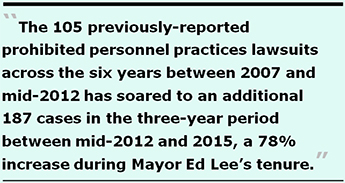 So which is it, Mr.
Dorsey? Are they preventable, merely aberrations, or the cost
of doing business?
So which is it, Mr.
Dorsey? Are they preventable, merely aberrations, or the cost
of doing business?
My 2013 article included a pie chart showing that 105 lawsuit settlements for prohibited personnel practices between 2007 and 2012 cost $12.1 million to settle with Plaintiff victims, including at least $1.4 million to settle 14 “wrongful termination” cases.
In addition, costs were substantially higher when City Attorney costs were added in. Deputy City Attorney’s spent a total of 43,195 hours at a total cost of $8.3 million defending the 105 cases against the City involving prohibited personnel practices, bringing the combined actual settlement awards and City Attorney time to at least $20.4 million in preventable waste of taxpayer funds — preventable precisely because they involve personnel practices long prohibited by law.
Add in the $1.3 million of taxpayer funds racked up in City Attorney time wasted during the inept proceedings on behalf of Mayor Ed Lee to oust Sheriff Ross Mirkarimi for alleged official misconduct. After wasting fully $22 million, Dorsey wants us to believe the City Attorney is trying to “protect” taxpayer dollars?
Those 105 cases are one clue that there’s a lot of bullying of City employees, cases oftentimes pure, thinly-disguised retaliation involving personnel practices already prohibited by law.
Surge of Cases Since 2012
In response to a records request placed on May 16, 2015 seeking updated records involving prohibited personnel practice lawsuits filed between mid-2012 and May 15, 2015 the City Attorney’s Office provided additional data.
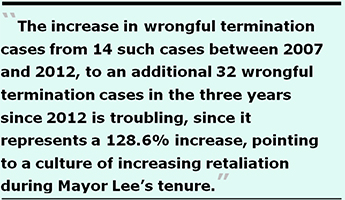 As the table below
shows, the 105 previously-reported prohibited personnel practices
lawsuits across the six years between 2007 and mid-2012 has soared
to an additional 187 cases in the three-year period between mid-2012
and 2015, a 78% increase during Mayor Ed Lee’s tenure.
As the table below
shows, the 105 previously-reported prohibited personnel practices
lawsuits across the six years between 2007 and mid-2012 has soared
to an additional 187 cases in the three-year period between mid-2012
and 2015, a 78% increase during Mayor Ed Lee’s tenure.
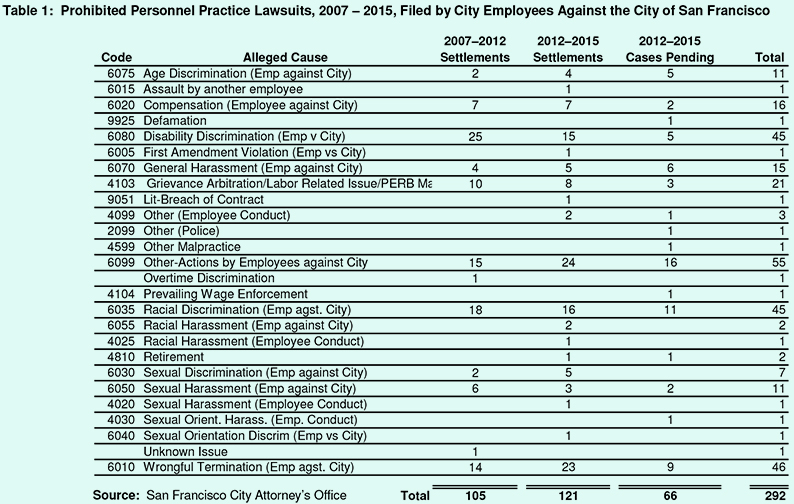
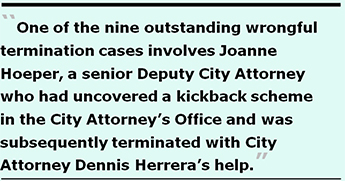 The increase in wrongful
termination cases from 14 such cases between 2007 and 2012, to
an additional 32 wrongful termination cases in the three years
since 2012 is troubling, since it represents a 128.6% increase,
pointing to a culture of increasing retaliation during Mayor Lee’s
tenure.
The increase in wrongful
termination cases from 14 such cases between 2007 and 2012, to
an additional 32 wrongful termination cases in the three years
since 2012 is troubling, since it represents a 128.6% increase,
pointing to a culture of increasing retaliation during Mayor Lee’s
tenure.
While I reported in May 2013 that the 105 settlements between 2007 and 2012 cost the City $12.1 million in settlements and an additional $8.3 million in City Attorney costs for a total of $20.4 million, the additional 121 cases settled between 2012 and 2015 have cost the City another $12.2 million, including $3.6 million in settlement awards and $8.6 million in City Attorney costs involved during litigation, bringing the total to at least $32.6 million since 2007, and that’s not counting settlement amounts and the City Attorney’s costs for time and expenses for the 66 pending cases that still haven’t been concluded at an unknown cost, or the underreporting by the City Attorney’s Office of actual costs when compared to the actual settlements approved by San Francisco’s Board of Supervisors.
At the same time, while the 14 wrongful termination cases between 2007 and 2012 cost the City $1.4 million in settlement costs alone, the 23 wrongful termination cases between 2012 and 2015 involved $1.2 million in settlement costs. And there’s nine outstanding wrongful termination settlements still not concluded, with an unknown amount of City Attorney expenses unreported, and settlement amounts still being negotiated.
Who Were the Actors?
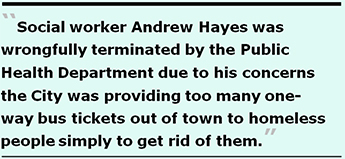 Given the surge from
105 to 292 prohibited personnel practice lawsuits, you may wonder
who and what were involved. While an exhaustive analysis would
be too lengthy here, a sampling of the cases is illuminating.
Given the surge from
105 to 292 prohibited personnel practice lawsuits, you may wonder
who and what were involved. While an exhaustive analysis would
be too lengthy here, a sampling of the cases is illuminating.
One of the nine outstanding wrongful termination cases involves Joanne Hoeper, a senior Deputy City Attorney who had uncovered a kickback scheme in the City Attorney’s Office and was subsequently terminated with City Attorney Dennis Herrera’s help; her eventual settlement with the City is predicted to involve at least another $750,000 settlement plus a huge bill for City Attorney time and expenses fighting her case.
As you may recall, Dr. Kerr’s lawsuit grew from his co-discovery with Dr. Mario Rivero that Laguna Honda Hospital officials were improperly raiding a trust fund established for the sole benefit of LHH’s patients, and spending the restricted-use trust funds on staff perks, instead. Kerr had named then-Director of Public Health, Mitch Katz and LHH’s Executive Administrator, Mivic Hirose as defendants in his lawsuit. Settlement Amount: $750,000 City Attorney Expenses: $450,493
As this article shows, Kelly O’Haire simply attempted to rid the Police Department of Officer Suhr, for gross violations of Police Department policies as someone unfit to remain in a public safety leadership position. She had named Suhr as a defendant in her lawsuit. Settlement Amount: $725,000 City Attorney Expenses: TBD
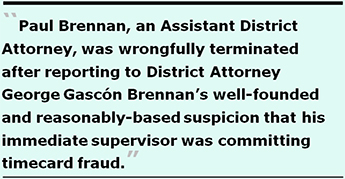 Andrew Hayes, a social
worker at Tom Waddell Health Center who had been hired under a
signed contract to be an advocate for homeless people, was wrongfully
terminated by the Department of Public Health due to his concerns
the City was providing too many one-way bus tickets out of town
to homeless people simply to get rid of them. He had named the
Director of Public Health, Barbara Garcia, as a defendant in his
lawsuit. Settlement Amount: $15,000 City Attorney Expenses: $247,773
Andrew Hayes, a social
worker at Tom Waddell Health Center who had been hired under a
signed contract to be an advocate for homeless people, was wrongfully
terminated by the Department of Public Health due to his concerns
the City was providing too many one-way bus tickets out of town
to homeless people simply to get rid of them. He had named the
Director of Public Health, Barbara Garcia, as a defendant in his
lawsuit. Settlement Amount: $15,000 City Attorney Expenses: $247,773
Xiaomei Ma, a Senior Industrial Hygienist at SFGH was wrongfully terminated by its notorious Associate Hospital Administrator, Delvecchio Finley, after she reported that another safety analyst had falsified documents to cover up deficiencies in SFGH’s environment and health program. She had named the City as the defendant in her lawsuit. Settlement Amount: $115,000 City Attorney Expenses: $142,015
Ron Szeto, the Acting Director of the Parking Authority in the Department of Parking and Traffic was wrongfully terminated. No court records could be found on the Superior Court web site to learn the story behind his termination, but a Google search uncovered the Parking Authority Commission’s January 15, 2008 meeting minutes in which the Parking Commission approved a $192,478 settlement in closed session. Given the extremely low City Attorney expenses in his case, the City may have known it could not fight Szeto’s wrongful termination claim. Settlement Amount: $192,478 City Attorney Expenses: $2,980
Janice Anderson-Santos, the Deputy Director of the Family and Children’s Service Division at the Department of Human Services was also wrongfully terminated. In July 2005, her initial civil complaint lawsuit alleging Trent Rhorer had engaged in discriminating and harassing treatment of her in 2003 wasn’t upheld in Superior Court, so she filed an appeal. After filing her appeal brief in January 2006, she was placed on a 10-day suspension, but received a termination notice while serving suspension. She had named the Rhorer as the defendant in her second lawsuit alleging wrongful termination. Settlement Amount: $2,000 City Attorney Expenses: $76,384
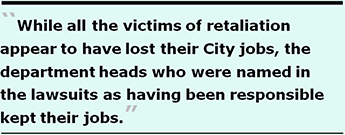 Paul Brennan, an
Assistant District Attorney was wrongfully terminated after reporting
to District Attorney George Gascón Brennan’s well-founded
and reasonably-based suspicion that his immediate supervisor was
committing timecard fraud, also known as “theft of time.”
Brennan had named Gascón as the defendant in his lawsuit.
Settlement Amount: $4,500 City Attorney Expenses: $7,441
Paul Brennan, an
Assistant District Attorney was wrongfully terminated after reporting
to District Attorney George Gascón Brennan’s well-founded
and reasonably-based suspicion that his immediate supervisor was
committing timecard fraud, also known as “theft of time.”
Brennan had named Gascón as the defendant in his lawsuit.
Settlement Amount: $4,500 City Attorney Expenses: $7,441
Margarita Herrera, a per diem “P-103” nurse at SFGH who has a Lupus disability for 14 years was wrongfully terminated within one month after returning to work following a medical leave of absence when her illness flared up and she needed medical interventions. Settlement Amount: $429,093 City Attorney Expenses: $160,595
Wrongful terminations also occurred in the Recreation and Parks Department, the Fire Department, Planning Department, MTA, Department of Juvenile Probation, the Fine Arts Museums, and other City Departments.
While all the victims of retaliation appear to have lost their City jobs, the department heads who were named in the lawsuits as having been responsible — or alternatively were responsible for the actions of their subordinates who engaged in wrongful termination — kept their jobs, including department heads Ed Reiskin, Phil Ginsburg, Joanne Hayes-White, John Rahaim, Trent Rhorer, Barbara Garcia, George Gascón — and poster-boy Greg Suhr, among others.
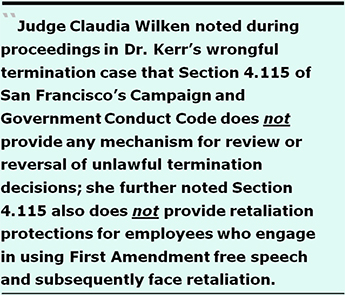 When WIll the Mayor Stop the Retaliators?
When WIll the Mayor Stop the Retaliators?
Back in 1989, then-Mayor Art Agnos appointed the then-young Ed Lee to be San Francisco’s first investigator for the City’s whistleblower ordinance. Now that Lee became Mayor, it’s time for him to come full circle and actually fix the many problems with the whistleblower program operated jointly by the Ethics Commission and the City Controller’s Office.
After all, just as then-Mayor Gavin Newsom took the bold, courageous step of allowing gay marriages by the City that lead to the June 25, 2015 U.S. Supreme Court 5–to–4 ruling legalizing gay and lesbian marriage in all 50 states, it’s long past time for Mayor Lee to take bold action to stop retaliation against City employees, and start getting rid of the brazen retaliators.
Fix the WPO: Adopt Civil Grand Jury’s Recommendations
The 2014–2015 Civil Grand Jury’s new report appears to have overlooked three key improvements that need to be amended in the Whistleblower Protection Ordinance.
The first involves City employee’s First Amendment rights protections. As Judge Claudia Wilken noted during proceedings in Dr. Kerr’s wrongful termination case, Section 4.115 of San Francisco’s Campaign and Government Conduct Code that can sanction officers or employees who engage in retaliation does not provide any mechanism for review or reversal of unlawful termination decisions.
Wilken further noted that, by its own terms, Section 4.115 only sets policies prohibiting retaliation against employees who file formal complaints or participate in formal investigations, but does not provide retaliation protections for employees who engage in using First Amendment free speech and subsequently face retaliation.
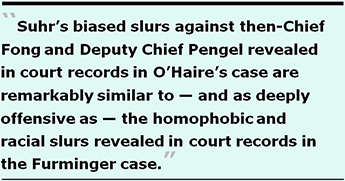 When will voters
— and labor unions that represent City employees — demand
that San Francisco’s Charter and the WPO be changed to include
basic First Amendment protections for City employees?
When will voters
— and labor unions that represent City employees — demand
that San Francisco’s Charter and the WPO be changed to include
basic First Amendment protections for City employees?
The second needed improvement involves the Jury’s recommendation #3 providing that the Ethics Commission be authorized to cancel retaliatory job actions. There should be a mechanism for review of all retaliatory job actions by an Administrative Law Judge who is completely independent of the City’s Department of Human Resources and the separate Civil Service Commission before a retaliatory job action may even be imposed at the departmental level.
And third, the WPO needs to have a provision added specifying that any manager in every City department found to have engaged in retaliation will face immediate suspension, and in instances where a harmed individual prevails in civil court, the manager(s) responsible for wrongful termination should themselves face immediate termination.
Retaliation “Tone” Set at the Top
D. Jan Duffy — Ms. O’Haire’s expert witness — is correct in indicating that Mayor Lee had both a duty to ensure retaliation against whistleblowers is detected and remedied, and that organizations should set the tone from the top on down that retaliation is not acceptable and will not be tolerated. Unfortunately, by continuing to support Suhr, the Mayor failed to set the appropriate tone.
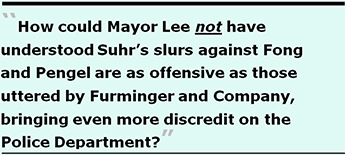 As far as that goes,
the heads of every City department — including Chief Suhr
— should also be setting the tone from the top on down that
retaliation is not acceptable. In Suhr’s case that didn’t
happen when he retaliated against Ms. O’Haire.
As far as that goes,
the heads of every City department — including Chief Suhr
— should also be setting the tone from the top on down that
retaliation is not acceptable. In Suhr’s case that didn’t
happen when he retaliated against Ms. O’Haire.
Shamefully, Suhr’s biased slurs against then-Chief Fong and Deputy Chief Pengel revealed in court records in O’Haire’s case are remarkably similar to — and as deeply offensive as — the homophobic and racial slurs by at least 14 police officers revealed in court records in the federal lawsuit against Sergeant Furminger that resulted in the texting scandal at the Police Department.
How could Mayor Lee not have understood Suhr’s slurs against Fong and Pengel are as offensive as those uttered by Furminger and Company, bringing even more discredit on the SFPD?
As one observer has noted, the City’s and the Police Department’s practice of “protecting their own” are thinly-disguised attempts to “limit liability” using so-called Risk-Management practices, in order to block costly lawsuits using bald attempts to never admit wrongdoing had occurred.
 It’s long past
time for the Mayor to set the tone. He should adopt all of the
Grand Jury’s recommendations to stop the culture of retaliation
against City employees by amending the Whistleblower Protection
Ordinance immediately. And Lee needs to rapidly reconsider his
support of Suhr, and fire him for having wrongfully retaliated
against O’Haire and for Suhr’s own egregious racial
and homophobic remarks worsening the SFPD texts scandal.
It’s long past
time for the Mayor to set the tone. He should adopt all of the
Grand Jury’s recommendations to stop the culture of retaliation
against City employees by amending the Whistleblower Protection
Ordinance immediately. And Lee needs to rapidly reconsider his
support of Suhr, and fire him for having wrongfully retaliated
against O’Haire and for Suhr’s own egregious racial
and homophobic remarks worsening the SFPD texts scandal.
The culture of retaliators keeping their jobs, while the victims of retaliation lose their livelihoods, needs to stop. Now.
Monette-Shaw is an open-government accountability advocate, a patient advocate, and a member of California’s First Amendment Coalition. He received the Society of Professional Journalists-Northern California Chapter’s James Madison Freedom of Information Award in the Advocacy category in March 2012. Feedback: monette-shaw@westsideobserver.